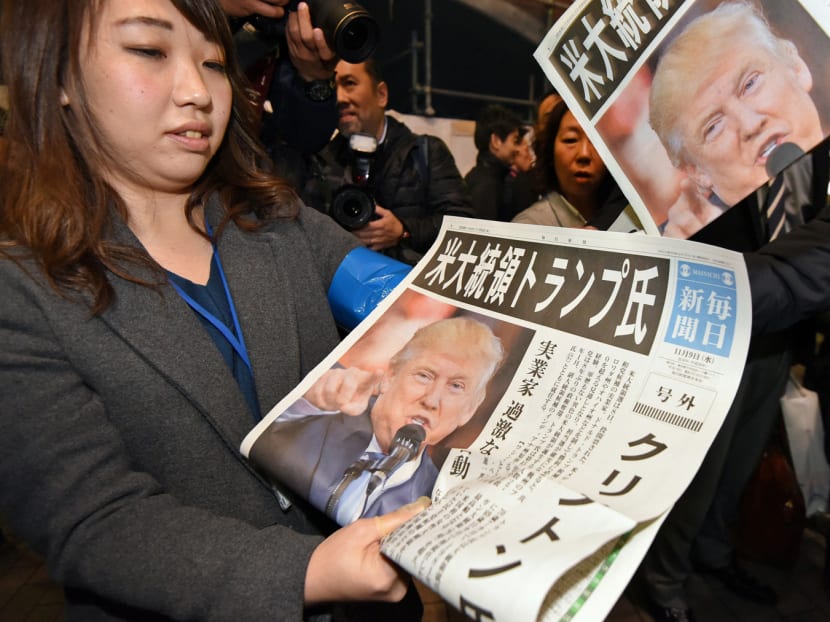Spectre of an inward-looking US hangs over Asian security balance
WASHINGTON — Mr Donald Trump’s stunning presidential election victory yesterday rippled way beyond the boundaries of the United States, upending an international order that has prevailed for decades and raising profound questions about America’s place in the world.

A Japanese newspaper reporting on Mr Trump’s win in the US presidential election yesterday. Asian leaders greeted Mr Trump’s victory cautiously, expressing hopes of continued engagement with the new US administration. Photo: AFP
WASHINGTON — Mr Donald Trump’s stunning presidential election victory yesterday rippled way beyond the boundaries of the United States, upending an international order that has prevailed for decades and raising profound questions about America’s place in the world.
For the first time since before World War II, Americans chose a president who promised to reverse the internationalism practised by predecessors of the country’s two major parties and to build walls both physical and metaphorical.
Mr Trump’s win foreshadowed an America more focused on its own affairs while leaving the world to take care of itself. For Asia, this has raised questions on whether Washington’s decades-long security and defence alliances with the region would unravel, leading to a potential nuclear arms race in North-east Asia.
Mr Trump — who has no foreign affairs or military experience — had advocated cutting back on security arrangements with Japan and South Korea and has said he would be open to both governments to build their own nuclear arsenals rather than depend on the US nuclear umbrella for protection against North Korea and China.
During his campaign, he had also said he would be willing to withdraw US forces from both Japan and South Korea if they did not substantially increase their contributions to the costs of housing and feeding those troops.
Mr Hong Ihk-pyo, a former policy adviser at South Korea’s Unification Ministry and a lawmaker with the nation’s main opposition party, said Mr Trump’s election victory could upset the Asian security balance since he has questioned the policies that had been supported by all previous US administrations. “He’s an outsider and a businessman who has no personal ties to other heads of state, and that adds to uncertainties,” Mr Hong said.
Many foreign governments are uncertain how much of Mr Trump’s rhetoric will be translated into policy, as he has frequently made contradictory statements and provided few details of how he would deal with the world.
Asian leaders greeted Mr Trump’s win cautiously, expressing hopes of continued engagement with the new administration. “Japan will keep working closely with the United States for peace and prosperity, for Asia-Pacific and the world,” Mr Yoshihide Suga, the chief Cabinet secretary, said yesterday.
In a sign of how anxious Tokyo is, Japan is sending a top official to Washington as early as next week to try to meet with those who will be responsible for the next White House administration, said Mr Katsuyuki Kawai, a political aide to Prime Minister Shinzo Abe in charge of diplomacy.
In South Korea, Foreign Minister Yun Byung-se said he believed Mr Trump would maintain the current US policy of pressuring North Korea over its nuclear and missile tests.
“Trump has indicated that the greatest problem facing the world is the nuclear threat, and members of his national security team hold the position that favours applying strong pressure against the North,” Mr Yun said.
The country’s ruling party chief Kim Gwang-lim added later that the deployment of US’ Terminal High Altitude Area Defence (Thaad) anti-missile system to counter North’s nuclear threat will also go ahead as planned under a Trump administration.
Still, Mr Trump’s promise to pull back militarily and economically left many contemplating a road ahead without an American ally. Asian nations have repeatedly called on the US to remained engaged with the region to balance against a more assertive China.
In the weeks running up to the US elections, there were already indications that some Asian countries are hedging against Washington by leaning closer towards Beijing.
Philippine President Rodrigo Duterte announced his “separation” from its traditional ally the US last month and declared he had realigned with China. Hanoi has recently moved to improve ties with China following years of cooling relations while Malaysia inked 14 agreements worth RM144 billion (S$47.5 billion) with China during Malaysian Prime Minister Najib Razak’s visit to Beijing last week.
“The question is whether you will continue to be involved in international affairs as a dependable ally to your friends and allies,” said Mr Kunihiko Miyake, a former Japanese diplomat now teaching at Ritsumeikan University in Kyoto. “If you stop doing that, then all the European, Middle Eastern and Asian allies to the US will reconsider how they secure themselves.”
And even some countries that might expect to see some benefits from an American retreat worried about the implications. Counterintuitive as it might seem, China was concerned about Mr Trump’s promise to pull American troops back from Asia.
“If he indeed withdraws the troops from Japan, the Japanese may develop their own nuclear weapons,” said Professor Shen Dingli, who specialises in international relations at Fudan University in Shanghai.
“South Korea may also go nuclear if Trump cancels the missile deployment and leaves the country alone facing the North’s threats. How is that good for China?”
Analysts said Mr Trump’s campaign rhetoric would inevitably be tempered by experience in the Oval Office, as well as by the advice of experts. It would not be so easy, for example, to withdraw completely from security alliances.
“His preferences for US-Asia policy are something of a wild card,” Dr Denny Roy, a senior fellow at the East-West Center in Honolulu told TODAY.
“That said, it will not be easy for one president to undo a decades-old, bipartisan US policy of strategic leadership, military forward deployment, and support for US friends and allies in the Asia-Pacific.” Agencies, with additional reporting by Eileen Ng






